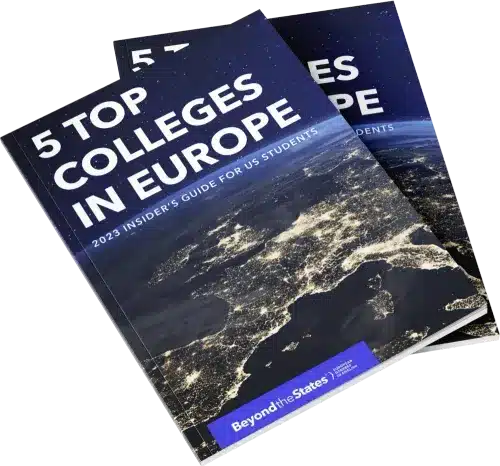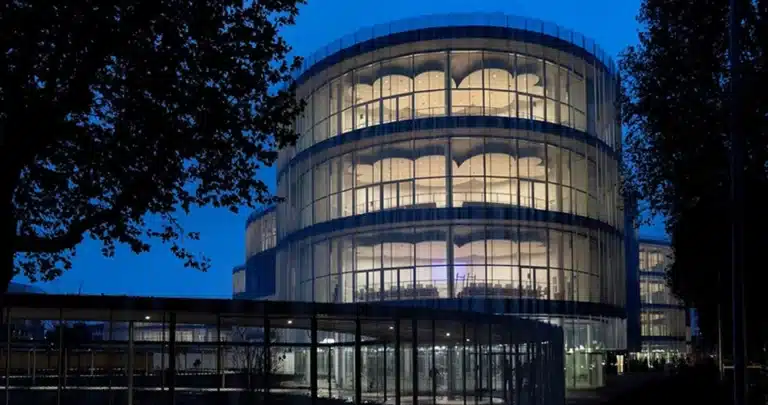International Studies vs Relations at Leiden University
Hey everyone! We’re Max and Macklin, two BTS student ambassadors who are second years at Leiden University at The Hague campus in the Netherlands. After hearing we were living in the same student housing via the BTS Facebook group, we met online just after our arrival in the Netherlands last August during a mandatory quarantine. This year we live together in an apartment with one of our friends who also studies at Leiden University.
FREE INSIDER’S GUIDE

Top 5 English-Taught Colleges in Europe
Kickstart you education abroad with a powerful degree taught entirely in English, all without taking on any student loans!
Our bachelor programs are International Studies (IS) and International Relations and Organizations (IRO), respectively. Because our programs are two of the most popular English programs at Leiden University and on the surface level may seem similar, we want to break down some of the ways they are distinct. In fact, many students at Leiden will switch between the two programs after their first year due to the widespread confusion about what we study!
Max’s Experience With IS
I’m Max and I grew up near Chicago, Illinois. I’m a second year International Studies student at Leiden. I’m also involved in university politics at Leiden University where I manage social media and election campaigns for the only party on campus that represents non-Dutch students.
Strategize the Path to College in Europe
We’ve set aside some time this week for one of our admissions experts to help
serious applicants with some ideas. Book a FREE call today; spots are limited!
First, let’s dive into what International Studies looks like at Leiden! The most important thing to know about IS is that it’s a humanities program, which means that we study international trends from a “people-centric” view. In other words, we study culture, language, and history rather than institutions and organizations. International Studies students also study politics and economics but from a human level rather than using statistics or normative theories. Most students’ favorite part of IS is that starting in the second semester of the first year you pick a region and language from that region to focus on. The regions you can pick are North America, East Asia, Europe, Middle East, Africa, Russia/Eurasia, South/South-East Asia, and Latin America. Some of the most popular languages are Mandarin, Arabic, Spanish, French, Swahili, and Korean. I chose Latin America and Portuguese because I heard amazing things about the lecturers and I’ve always been interested in Latino culture and the region’s politics. IS general courses place an emphasis on both self-study as well as small groups that meet every other week and language courses meet up to three times a week. From this description, you may have noticed that the International Studies program is extremely broad. We study a wide variety of topics and by the end students gain an interdisciplinary view of the world using their region of choice as a case study to apply their knowledge. As a result of the program being so broad, what comes after the bachelor is definitely up to each student. If you’re looking for a bachelor that’s going to prepare you for a career right out of university, this is definitely not the program for you. This means extra-curriculars (e.g. minors, honours programs, internships) are vital for applying to master’s programs and jobs after you graduate. Luckily, being at the political center of the Netherlands and the city of peace and justice, The Hague has plenty of opportunities to boost your CV.
Macklin’s Experience With IRO
Hi! I’m Macklin, I’m a second year student studying IRO. Originally from Connecticut, I moved to The Hague in August of 2020. You have seen my video showing a day in the life as a student in the Netherlands. In this blog post, I hope to go further in depth on the specifics of IRO and how it is different from IS.
In contrast to IS, IRO has a social sciences approach and is under the Political Sciences institute at Leiden. Due to this difference, within IRO there is more of an emphasis on theory and a scientific understanding of international relations. Rather than semester-long classes, the academic year is divided into four blocks that are eight weeks long with an exam week at the end of each block. Students will instead have two to three classes each block allowing the possibility to become immersed in a few subjects at a time and gain a deep understanding of the content. IRO emphasizes self-study rather than going to workgroups. Most contact hours will be during lectures and grades for a class can range from a few papers to only considering the exam. There is a wide range of subjects covered throughout IRO, such as economics, world history, the EU, and comparative politics. Although there is no ability to choose a region or language for IRO, the program prepares students for many career opportunities through its more specific, political science approach. There are courses on statistics and quantitative theory, especially in the first year, which may deter some students. However, it allows a broader understanding of international relations and politics beyond the cultural factors, which are also touched upon in the program. Due to the lack of flexibility, it is important to consider if political science is the right program for you, if so, it provides plenty of opportunities for masters both in the humanities and the social sciences due to covering both topics. Similar to IS there are opportunities outside of the study to enhance the university experience, such as honours programs, student organizations, internships, and beyond. Being at the political heart of the Netherlands provides plenty of opportunities to maximize the experience and tailor it right for you!
More About Leiden University
Both IS and IRO have a semester built into their structure for an internship, minor, or study abroad program in the first semester of the third year and a bachelor thesis in the second semester. The admission system is similar for both programs requiring 3 AP scores of 4+ or 4 AP scores of 3+, alternatively, the international baccalaureate (IB) is also accepted. Additionally, IRO is a “numerus fixus” program which means students are selected based upon a motivation letter and short test of some of the content that will be taught in the program. Overall, both programs benefit from being located in The Hague which is a great city for international students. Great parks, modern classrooms, and people from all over the world make Leiden University campus The Hague a great place to study. Rotterdam and Amsterdam are accessible in under an hour by train and Leiden, our University’s main campus and a charming student city, is only 15 minutes away.
Other Leiden University programs based in The Hague are Urban Studies, Security Studies, and LUC (a living-learning community liberal arts track). If you are worried about meeting the requirements for admission but want to study in The Hague, there are great programs with no AP requirements at The Hague School of Applied Science. There are so many benefits to studying in Holland from bike culture to the prevalence of English in everyday life! Reach out to either of us if you have any questions about our programs, experience in The Netherlands, or studying in Europe in general! We are both in the Beyond the States student Facebook group.
Wishing you the best of luck on your search,
Max Adams and Macklin Miezejeski










